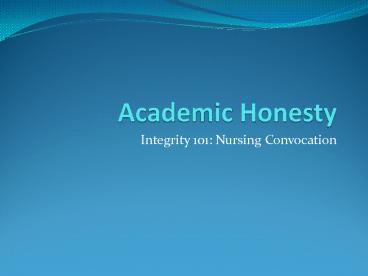Academic Honesty - PowerPoint PPT Presentation
1 / 13
Title: Academic Honesty
1
Academic Honesty
- Integrity 101 Nursing Convocation
2
A Scriptural Basis for Academic Integrity
- Rendering to Caesar what is Caesars
- Owe no man anything except to love
- Individual giftedness (I Cor. 12)
- Self-judgment (If we judge ourselves, we will
not come into judgment) - Thou shalt not steal (obviously)
3
Scholarly Integrity Some Characteristics
- Generosity Respectful treatment of others work
- Honesty Accurate representation of others
thoughts and your own findings - Gratitude Giving all possible credit to others
- Industriousness Willingness to work hard to find
the truth and share it effectively - Humility Accurate estimation of your own
contributions - Remember We work (study, research, and write)
for God, not for ourselves.
4
Academic Integrity at LU
- Avoid these things
- Cheating
- Falsification
- Plagiarism
- Note If you make it a point to be academically
honest, you wont have any of these issues.
5
Cheating Some Definitions
- Referring to information not specifically
condoned by the instructor. - Receiving information from a fellow student.
- Stealing, buying, selling or transmitting a copy
of any examination. (Liberty Way) - A form of dishonesty in which a student attempts
to give the appearance of a level of knowledge or
skills that the student has not obtained
(Graduate Catalog, 2008-09, pp. 32).
6
Falsification Some Definitions
- Unauthorized signing of another person's name to
an official form or document. - Unauthorized modification, copying, or production
of a University document. (Liberty Way) - Inventing or distorting the origin or
content of information used as authority
(Graduate Catalog, 2008-09, p. 33). - This includes misrepresenting a sources ideas or
arguments. - This includes falsely reporting research results.
- This includes deliberate suppression or
distortion of information sources.
7
Plagiarism Some Definitions
- Omitting quotation marks or other conventional
markings around material quoted from any printed
source. - Paraphrasing a specific passage from a specific
source without properly referencing the source. - Replicating another student's work or parts
thereof and submitting it as an original.
(Liberty Way) - A form of intellectual theft (Graduate Catalog,
2008-09, p. 32).
8
Plagiarism Three Places It Occurs
- Quotations
- DIRECT transcriptions of others language
- Require quotation marks, parenthetical citations,
and bibliographic entry - Paraphrases
- Rewording others language
- Require parenthetical citations and bibliographic
entry - Summaries
- Rehearsing or referring to others ideas or
findings (require parenthetical citations and
bibliographic entries)
9
When NOT To Cite
- When you come up with an idea entirely on your
own. - When you do primary research and want to report
the results of your study. - When you have a thought that grows out ofbut is
different fromwhat you talked about in class. - When, conversing with others, you come to a
realization you had not had previously. - When the fact you refer to is common knowledge
- If your sources all assume something is true or
well known, then you can too (e.g., Projection
and displacement are common phenomena in the
counseling profession). - If your next-door neighbor, spouse, and child all
know something, then its common knowledge (e.g.,
Sesame Street is a childrens television show).
10
When You Research
- Take good notes
- Write down sources bibliographic data.
- Write down quotations EXACTLY (with page
numbers). - Read carefully so that you have an accurate
understanding of others work. - Try to learn as much as you can from each source.
- When you get an idea, write it down and mark it
as your own. - Finish your research before you begin writing.
11
When You Write
- Close your web browser, and avoid the temptation
to cut and paste. - Write your citations and bibliography AS YOU
GOnot at the end. - Dont be afraid to work hard to get it right
- Be clear.
- Be organized.
- Make transitions between others thoughts and
your own clear and obvious. - Revise through as many drafts as necessary.
12
Some Resources
- Your professors
- The LU Graduate Writing Center (www.liberty.edu/gr
aduatewritingcenter) - Plagiarism web resources
- APA formatting help
- Writing-related web links
- Dr. Emily Heady (eheady_at_liberty.edu 592-3713 )
13
Concluding Thoughts
- Remember
- If we really believe we are working for Gods
glory, we will take our scholarly labor
seriously - Well remember the larger spiritual context in
which we learn and work. - Well do our very best to get it right.
- Well seek truth at all costs.
- If we need help, well be humble enough to ask.
- There is no difference between the work you do
for God and the work you do for your classes!































